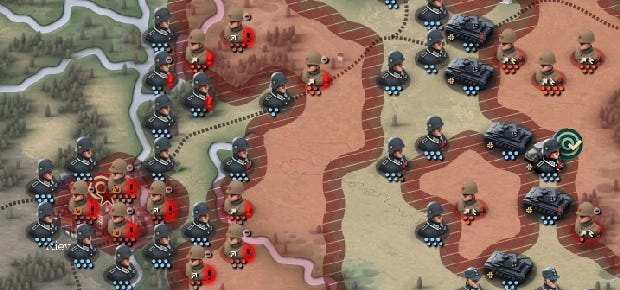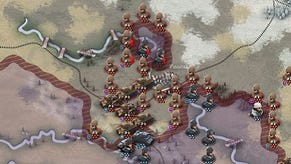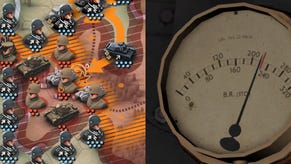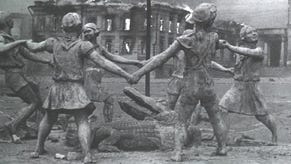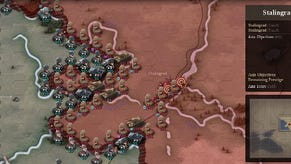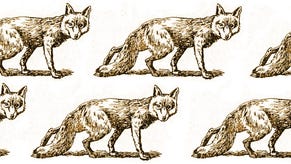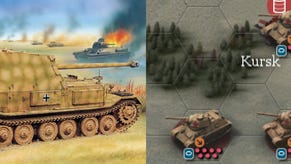Game Swap: Unity Of Command
Graham recommends Pip a WW2 strategy game
Game Swap is a new series in which one person recommends another a game they might like. This week, Graham suggests Pip play turn-based wargame Unity of Command [official site].
Graham: Pretty much everyone who has ever written about Unity of Command, myself included, has described it as a gateway into the normally inaccessible historical strategy genre. That's because it has simple, clean artwork and simple, clean rules governing its combat, while retaining historical accuracy in setting, unit design, and even the tactics it encourages as you (the Axis or Soviets) squabble over territory and supply lines on the Eastern Front of World War II. I recommended it to Pip because I want to test the theory that it's a gateway, and because I know Pip enjoyed turn-based strategy in Banner Saga and has no problem with much more complex games such as Dota and League of Legends.
Pip: When you recommended Unity Of Command to me we were on a Skype call with Adam. I dutifully went and looked up the game on Steam. Adam and you then started talking about what a good recommendation it was and I think I said something very calm and open-minded like "How interesting! I can definitely give this a go!"
Did you know that I was internally screaming at that point? I mean, I don't enjoy wargaming, nor do I really like turn-based strategy of any kind. I also go cold at the idea of hex tiles and of mining out historical conflict in this way. "The thing I liked about Banner Saga was the story!" I wanted to say.
Did any of that come across or was my poker face/voice actually successful?
Graham: I thought I detected a slight hint of hesitation. I'm not surprised: if you're not already into these sorts of things, there is possibly no valid gateway. Or I should have made it easier on both of us and recommended a turn-based strategy game that wasn't also about winning the war for the Nazis. Did this turn out to be a terrible recommendation?
Pip: Actually it didn't. I'm as surprised as anyone by this! I don't necessarily know how good a gateway it would be if I hadn't agreed to be part of this feature because I will say that I started off by trying to read the manual. The manual is 45 pages long. I think I retained about eight words of that.
If I hadn't been set on keeping an open mind and giving this a good go I think I would have decided you were a liar and tapped out at that point!
Instead I booted up the game and tried to do some tutorial things and some practice campaign things to get a feel for the game. I hoped that actually "doing" would be more effective than "reading" and it was.
What I encountered was something closer to a puzzle than a wargame. You have the hex tiles and the units and so on, but each scenario is presented as a puzzle which you need to solve in a maximum number of moves. In that way it feels more like those puzzles you used to get in the paper where it gave you a chess board with pieces already in a particular configuration and got you to work out how to win from there.
There's more wiggle room in Unity Of Command, as evidenced by the fact that you can achieve different types of victory based on the number of turns you take to capture all the objectives, but the feeling is similar. I'm also early enough in the game that the number of moves you have at your disposal is tiny. Six moves in the case of the scenario I just played. That means I don't feel like I might make a mistake early on and only find out about it in fifty-five moves time.
What I will say, though, is that I'm not sure how much I "know" at this point. I've enjoyed repeating the training stuff and first mission in order to actually bludgeon my way through them. That means I must have learned SOMETHING but I don't feel like I'm much further along in terms of actually positioning my units or strategising. I'm also not sure how increases in difficulty will affect the experience. It's taken me a couple of hours to get to the second mission. I completed that one first time, but it wasn't because of strategising on my part, particularly.
I worry that if the game doesn't tease that out of me or somehow add puzzles to teach things then I might flounder and fail, bashing against a puzzle over and over until I lose the will to play.
Graham: It's been a while, but I remember the difficulty curve being pretty good at challenging you gradually. Mainly though I think it does well at leaning on quite a small number of principles. Like, by this point you probably have some sense that you need to defend your own supply lines and that one of the best (or only) ways to defeat your opponent is to break their supply lines. That never really changes as you progress through the campaign. Nor does the number of turns you have available really increase that significantly, so you should never read that point of games lasting 55 turns in which you actually failed on turn 4.
Because the number of elements is relatively low, hopefully if you do reach a mission at which you fail repeatedly, each failure still brings some new explicit knowledge that you can apply next time out. That's what I find stops these games becoming frustrating: "oh, I died there because I over-extended myself," "oh, that time I failed to devote enough resources to defending Belgorod", "oh, I shouldn't have told those horseymen to attack that tank."
The thing I'll say is: play it in bursts. Each mission can end within a relatively short timeframe, so treat it more like… Spelunky? Pop it open, do a run or two, and whatever your outcome set it aside for the day. Those newspaper chess puzzles were most fun when you had one a day rather than a whole book of them.
Does the World War 2 setting put you off at all? Would some other historical setting appeal more, or a fantasy setting? I'm wondering what exactly inspires your initial dislike of wargames and turn-based strategy games.
Pip: I'm not sure. I've been thinking about that because it was certainly a factor when I booted up the game. I listen to a bunch of history podcasts and they have really affected how I view war in gaming. I think I'm generally uncomfy about/wary of games which take those settings, but I'm also capable of distancing myself when I think a game is doing something interesting within that space or is making a comment about those events.
In this case I'm not really sure what I make of it yet. It doesn't feel realistic or anything, and it's so hard to draw any parallels between what you're doing in this heavily abstracted game and the messy awful history upon which it's based. I'm trying to solve a WW2-themed puzzle rather than being made to feel like I'm in any way commanding an army.
I guess the army theme is a weird breath of fresh air in the sense that I don't really play any army games. But I occasionally get that reminder of actual warfare when it tells me people were killed in action, or it delivers a bit of blurb about the conflict as it played out. I also try not to think about who I'm playing as.
The one thing I would say, and this is nothing to do with the history side of things, is that I hate sacrificing any units in games. I hate it in chess and I hate it here. I think that's why I struggle with particular types of strategy game, because my natural playstyle is to try and keep EVERYBODY safe. A victory for me would be everyone on my side still being alive at the end.
Graham: I guess you're not playing as the Soviets, then?
One thing I thought about is whether I should have recommended a turn-based strategy game that was more on the Fire Emblem side of things. There are a few that are broadly similar to that game on PC, with mechanics not too far away from Unity of Command but with named characters, more story, a less oppressive or potentially troubling setting. The downside might have been though that characters dying in those games is still sometimes either unavoidable or extremely difficult to avoid, which is maybe worse when they have names and the unit standing next to them is their boyfriend or their kid. At least we'll never know the names of the the soldiers we lead towards death in Unity of Command? Er.
Pip: This is the kind of leadership style RPS needs.
No, I think, on balance, I'm glad you went with this one. There's something weirdly appealing about the anonymity of the units and the lack of a single leader's story across what I've played. I also hadn't realised how sick I was of playing in the same handful of settings recently. I'm not saying I'm actively enjoying World War II or anything, but the feeling of being somewhere different, both in terms of genre and setting is actually really good for blowing away some cobwebs.
It was also interesting to try to take a broader view of a game. Usually I gravitate to games which let me only control one thing. I like poking around in scenery or investigating environments as opposed to commanding groups or assigning tasks. I'm one of gaming's happy footsoldiers who is horrified every time a command opportunity turns up, essentially. This was a manageable way to try something different.
That said, it took me whole days to work up the enthusiasm/nerve/impetus to actually boot the damn thing up in the first place! Has anyone else you know who doesn't like these kinds of games tried it and liked it?
Graham: No! Basically me and every other games journalist is full of shit. I've always seen it described as a gateway, but I've never seen anyone say, "And I recommended it to so-and-so and it acted as a gateway." It's just assumed because of its relative simplicity, I think.
You mentioned above about it not being particularly realistic, and I agree that it's abstract in lots of ways, but I do still like that it offers a more fair representation of World War II battlefield tactics than many other accessible games with the same setting. Like, obviously Call of Duty and Medal of Honour paint a picture of individual heroism turning the tide of war, but even other accessible strategy games like the real-time Company of Heroes doesn't necessarily give you a sense of the bigger-picture issues faced by a soldier in that particular conflict over and above any other. Unity of Command is described on its Steam page as being an "operational-level" strategy game, and I hope that gives it and its setting value that at least somewhat justifies the unavoidably troubling choice of setting.
It sounds like you're enjoying Unity of Command so far. Do you enjoy it enough that you think you'd play another similar game of its type, without me foisting it upon you for the purpose of an article? Either turn-based or strategy or World War II. Is Adam going to have to fight you over the review code for Hearts of Iron 5 or whatever?
Pip: I think what I've worked out is this: I am enjoying Unity of Command more than I thought and I'll stick with it beyond this feature to see how far I get but I don't see it functioning as a gateway. I'm getting on with Unity of Command because it feels closer to a puzzle game and I suspect that the further we get from that, and the more unruly or long-winded the less fun it will be. This hasn't awakened an interest in broader strategy or a desire to lead armies. I think if Unity of Command focused on those things I wouldn't have even made it this far. I'd also say that the genre trappings – the imposing manual and the language and the setting – meant I wouldn't have even started if I hadn't been doing Game Swap!
So for me it's definitely not a gateway. It's more like one of those niches you get in a chapel and you put an interesting statue in there.
Graham: Hoo… ray? I think that sounds like I win, but in conclusion, is it a hit or miss?
Hit-ish!
Pip: This specific recommendation was a success in that it picked out a game I never in a million years would have thought of playing for myself and it turned out to be something I started to enjoy. That said, one of the reasons for the recommendation was to see if Unity of Command would act as a softer introduction to a whole genre and, at least from what I've played so far, that doesn't feel true. It's its own thing – still too far from the games I'm truly terrified of or bored by to act as a stepping stone. If you want me anywhere near Hearts of Iron you'll need to coax me towards it through several hundred more of these Game Swaps!
